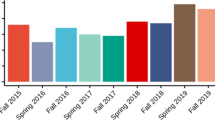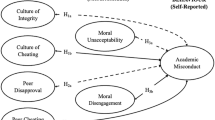Abstract
Academic integrity is becoming increasingly important to managing academic institutions. Accordingly there are efforts to uniformly assess campus attitudes to such issues as cheating in assessments along with the policies and procedures in place to address them. This paper seeks to summarize and understand the attitude of the students and academic staff at an Australian university towards academic integrity, as reflected in the results of a campus-wide survey, using both qualitative and quantitative analysis. The main finding of the quantitative results was the disconnect between academic staff and students belief’s about academic honesty and the reactions of students and academics to dishonest behaviour. Four key themes of academic honesty were identified through qualitative analysis, being those of cheating, student, solutions to cheating and general concerns.

Similar content being viewed by others
Notes
For instance, the Center for Academic Integrity in the USA (http://www.academicintegrity.org/), and the Asia-Pacific Forum on Educational Integrity in Australia (http://www.apfei.edu.au/).
For instance, the Center for Academic Integrity in the USA (http://www.academicintegrity.org/), and the Asia-Pacific Forum on Educational Integrity in Australia (http://www.apfei.edu.au/).
John Dawkins was the Minister for Employment, Education and Training in the 1980s under the Bob Hawke (Labour party) PrimeMinistership.
The Anglo-Celts (British and Irish ethnicity or ancestry) still form nearly 70 % of the Australian population, down from 98 % in 1900 and remain the dominant group in politics, economics, the public sector, academe, farming, the armed forces and so forth.
John Howard was the Liberal (conservative party) Prime Minister from 1996 to 2007.
http://acad-integrity.rutgers.edu/rutgers.asp (accessed 12/12/2013).
Out of which two-thirds of these academics were satisfied or very satisfied with the way their referrals were handled. One in six academics was dissatisfied and the remainder were neutral.
References
Ashworth, P., Bannister, P., & Thorne, P. (1997). Guilty in whose eyes’? University students perceptions of cheating and plagiarism in academic work and assessment. Studies in Higher Education, 22(2), 187–203.
Atkins, J., & Herfel, W. (2006). Counting beans in the degree factory: some practical meta-ethical reflections on academic integrity in Australian universities. International Journal for Educational Integrity, 2(1), 3–12.
Barnett, D., & Dalton, J. (1981). Why college students cheat. Journal of College Student Personnel, 22(6), 545–551.
Barrie, S. (2007). A conceptual framework for the teaching and learning of graduate attributes. Studies in Higher Education, 32(4), 439–458.
Bowers, W. (1964). Student dishonesty and its control in college. New York: Bureau of Applied Social Research Columbia University.
Bretag, T., Mahmud, S., Wallace, M., Walker, R., James, C., Green, M., East, J., McGowan, U., & Partridge, L. (2011). Core elements of exemplary academic integrity policy in Australian higher education. International Journal for Educational Integrity, 7(2), 3–12.
Brickman, W. (1961). Ethics, examinations, and education. School and Society, 89(December), 412–415.
Bushway, A., & Nash, W. (1977). School cheating behavior. Review of Educational Research, 47(4), 623–632.
Considine, M., Marginson, S., Sheehan, P., & Kumnick, M. (2001) The comparative performance of Australia as a knowledge nation Report to the Chifley Research Centre Melbourne, Australia.
Curtis, G., & Popal, R. (2007). An examination of factors related to plagiarism and a five-year follow-up of plagiarism at an. Australian university International Journal for Educational Integrity, 7(1), 30–42.
Daniel, L., Blount, K., & Ferrell, C. (1991). Academic misconduct among teacher education students: a descriptive correlational study. Research in Higher Education, 32(6), 703–724.
Deshpande, S., Joseph, J., & Berry, K. (2012). Ethical misconduct of business students: some new evidence. American Journal of Business Education, 5(6), 719–726.
Diekhoff, G., LaBeff, E., Clark, R., Williams, L., Francis, B., & Haines, V. (1996). College cheating: ten years later. Research in Higher Education, 37(4), 487–501.
Dordoy, A. (2002) Cheating and plagiarism: student and staff perceptions at Northumbria. Proceedings of the Northumbria Conference. Newcastle upon Tyne July p. 4.
Ferrell, C., & Daniel, L. (1995). A frame of reference for understanding behaviors related to the academic misconduct of undergraduate teacher education students. Research in Higher Education, 36(3), 345–375.
Flint, A., Macdonald, R., & Clegg, S. (2005) Emotion, practice, and plagiarism: exploring the staff perspective. In A. Peden-Smith, F. Duggan, (Eds) Plagiarism: Prevention, practice and policy conference (pp. 65–72). 29–30 June 2004 Newcastle: Northumbria University Press.
Freeman, M., Clarkburn, H., & Treleaven, L. (2007) A collaborative approach to improving academic honesty. In A. Brew, J. Sachs (Eds.), Transforming a university: The scholarship of teaching and learning in practice (pp. 153–161). Sydney University Press; 255–285.
Glaser, B. (1992). Basics of grounded theory analysis: Emergence vs forcing. Mill Valley: Sociology Press.
Glaser, B.,& Strauss A. (1967) Discovery of grounded theory: Strategies for qualitative research. Sociology Press.
Haines, V., Diekhoff, G., LaBeff, E., & Clark, R. (1986). College cheating: immaturity, lack of commitment and the neutralizing attitude. Research in Higher Education, 25(4), 342–354.
Jendrek, M. (1992). Student reactions to academic dishonesty. Journal of College Student Development, 33(3), 260–273.
Jensen, L., Arnett, J., Feldman, S., & Cauffman, E. (2002). It’s wrong, but everybody does it: academic dishonesty among high school and college students. Contemporary Educational Psychology, 27(2), 209–228.
Kirkvliet, J. (1994). Cheating by economics students: a comparison of survey results. Journal of Economic Education, 25(2), 121–133.
Le Masurier, M. (2010). Nine ways to reduce plagiarism: findings from The Plagiarism Project. Synergy, 30, 4–9.
Marginson, S. (2005). Diversity in the Nelson system. Campus Review, 15(25), 8–9.
Maurer, H., Kappe, F., & Zaka, B. (2006). Plagiarism—a survey. Journal of Universal Computer Science, 12(8), 1050–1084.
McCabe, D. (2003). Faculty and academic integrity: the influence of current honor codes and past honor code experiences. Research in Higher Education, 44(3), 367–385.
McCabe, D., & Trevino, L. (1997). Individual and contextual influences on academic dishonesty: a multicampus investigation. Research in Higher Education, 38(3), 379–396.
McCabe, D., Trevino, L., & Butterfield, K. (2001). Cheating in academic institution: a decade of research. Ethics & Behavior, 11(3), 219–232.
McKibban, A., & Burdsal, C. (2013). Academic dishonesty: an in-depth investigation of assessing measurable constructs and a call for consistency in scholarship. Journal of Academic Ethics, 11(3), 185–197.
Newstead, S., Franklyn-Stokes, A., & Armstead, P. (1996). Individual differences in student cheating. Journal of Educational Psychology, 88(2), 229–241.
Perry, L. (2001). Why do students plagiarise? Norfolk: Dominion University Factory Workshop.
Pulvers, K., & Diekhoff, G. (1999). The relationship between academic dishonesty and college classroom environment. Research in Higher Education, 40(4), 487–498.
Roth, N., & McCabe, D. (1995). Communication strategies for addressing academic dishonesty. Journal of College Student Development, 36(6), 531–541.
Rutgers University (2010) Academic integrity Rutgers University student and staff surveys URL: http://acad-integrity.rutgers.edu/rutgers.asp (Accessed 2/3/11).
Song-Turner, H. (2008). Plagiarism: academic dishonesty or blind spot of multicultural education? Australian Universities Review, 50(2), 39–50.
Underwood, J., & Szabo, A. (2003). Academic offences and e-learning: individual propensities in cheating. British Journal of Educational Technology, 34(4), 467–477.
Wajda-Johnson, V., Handal, P., Brawer, P., & Fabricatore, A. (2001). Academic dishonesty at the graduate level. Ethics & Behaviour, 11(3), 287–305.
White, F., Owens, C., & Nguyen, M. (2008) Using a constructive feedback approach to effectively reduce student plagiarism among first-year psychology students. In Symposium proceedings: visualisation and concept development: Uniserve Science (pp 127–132). University of Sydney.
Whitley, B. (1998). Factors associated with cheating among college students: a review. Research in Higher Education, 39(3), 235–271.
Whitley, B. (2001). Gender difference in affective responses to having cheated: the mediating role of attitudes. Ethics & Behaviour, 11(3), 249–259.
Yeo, S. (2007). First-year university science and engineering students’ understanding of plagiarism. Higher Education Research and Development, 26(2), 199–216.
Acknowledgments
The authors would like to thank Assoc. Prof. Abhaya Nayak and Assoc. Prof. Pundarik Mukhopadhaya for their contribution to initial discussions and development of this research project. We also acknowledge the contributions of students and academic staff who participated in this study.
Author information
Authors and Affiliations
Corresponding author
Rights and permissions
About this article
Cite this article
Busch, P., Bilgin, A. Student and Staff Understanding and Reaction: Academic Integrity in an Australian University. J Acad Ethics 12, 227–243 (2014). https://doi.org/10.1007/s10805-014-9214-2
Published:
Issue Date:
DOI: https://doi.org/10.1007/s10805-014-9214-2





